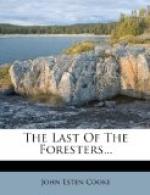And as the happy party—grouped upon the grassy knoll, like some party of shepherds and shepherdesses, in the old days of Arcady—gazed on the beautiful spectacle, the voices of the negroes coming from their work were heard, driving their slow teams in, and sending on the air the clear melodious songs, which, rude and ludicrous as they seem, have yet so marvellous an effect, borne on the airs of night.
Those evening songs and sounds! Not long ago, one says, I stood, just at sunset, on the summit of a pretty knoll, and, looking eastward, saw the harvesters cutting into the tall, brown-headed, rippling wheat. I heard the merry whistle of the whirling scythes; I heard their songs—they were so sweet! And why are these harvest melodies so soft-sounding, and so grateful to the ear? Simply because they discourse of the long buried past; and, like some magical spell, arouse from its sleep all the beauteous and gay splendor of those hours. As the clear, measured sound floated to my ear, I heard also, again, the vanished music of happy childhood—that elysian time which cannot last for any of us. I do not know what the song was—whether some slow, sad negro melody, or loud-sounding hymn, such as the forests ring with at camp-meetings; but I know what the murmuring and dying sound brought to me again, living, splendid, instinct with a thoughtful but perfect joy. Fairyland never, with its silver-twisted, trumpet-flower-like bugles, rolled such a merry-mournful music to the friendly stars! I love to have the old days back again—back, with their very tints, and atmosphere, and sounds and odors—now no more the same. Thus I love to hear the young girl’s low, merry song, floating from the window of a country-house, half-broken by the cicala, the swallow’s twitter, or the rustling leaves;—I love to hear the joyous ripple of the harpsichord, bringing back, with some old music, times when that merry music stamped the hours, and took possession of them—in the heart—forever more! I love a ringing horn, even the stage-horn—now, alas! no more a sound of real life, only memory!—the thousand murmurs of a country evening; the far, clear cry of wild-geese from the clouds; the tinkling bells of cattle; every sound which brings again a glimpse of the far-glimmering plains of youth. And that is why, standing on this round knoll, beneath the merrily-rustling cherry-trees, and listening to the murmurous song, I heard my boyhood speak to me, and felt again the old breath on my brow. The sun died away across the old swaying woods; the rattling hone upon the scythe; the measured sweep; the mellow music—all were gone away. The day was done, and the long twilight came—twilight, which mixes the crimson of the darkling west, the yellow moonlight in the azure east, and the red glimmering starlight overhead, into one magic light. And so we went home merrily, with pleasant thoughts and talk; such pleasant thoughts I wish to all. Thus wrote one who ever delighted in the rural evenings and their sounds;—and thus listened the young persons, whose conversation, light and trivial though it seem, we have not thought it a loss of time to chronicle, from morn till eve.




